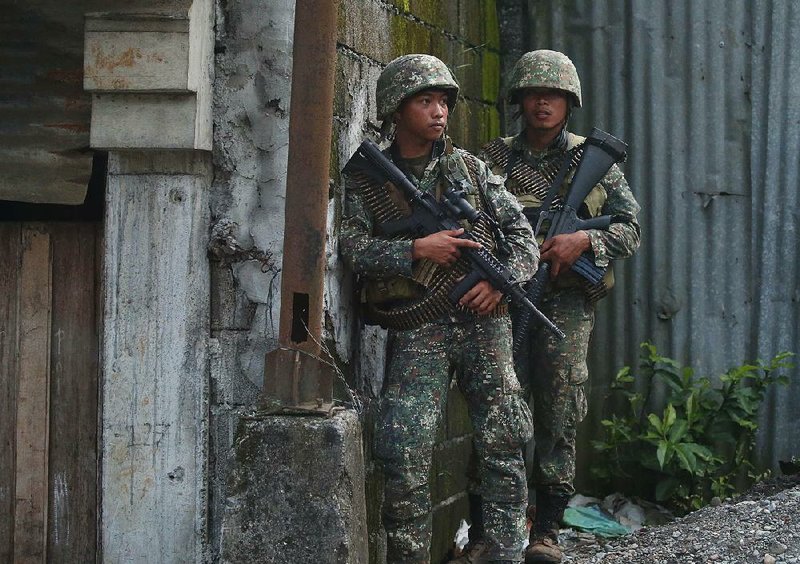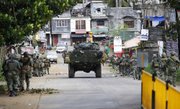MARAWI, Philippines -- Philippine forces found corpses in the streets of a besieged southern city on Sunday, including at least eight civilians who appeared to have been executed, as soldiers battled a weakened but still forceful group of militants linked to the Islamic State extremist group.
The death toll from six days of fighting neared 100.
Marawi, a 34-square-mile city comprising dozens of districts and villages, is home to some 200,000 people. The crisis there has grown increasingly dire as the militants fend off a military that has unleashed attack helicopters, armored vehicles and scores of soldiers.
The violence prompted President Rodrigo Duterte on Tuesday to declare 60 days of martial law in the southern Philippines, where a Muslim separatist rebellion has raged for decades. But the recent bloodshed in Marawi has raised fears that extremism is growing as smaller militant groups unify and align themselves with the Islamic State group.
Thousands of civilians have streamed out of Marawi, and more than 2,200 were still trapped inside the city. Many sent text messages to a hotline set up for trapped residents. The civilians were begging to be rescued and reporting that their homes had been destroyed, said Zia Alonto Adiong, an official in Lanao del Sur, one of the country's poorest provinces.
"The number [of people sending messages] is still continuing to rise," Adiong said. "They are asking for help to extract them or send relief goods."
"Some of them fear for their lives and properties because of the ongoing military operation," he added.
Relief workers showed The Associated Press some of the messages.
"Have mercy on us, we don't have any more water to drink," reads one.
Speaking at the evacuation center on Sunday, Saddat Liong said his house was hit by mortar fire and burned to the ground. Liong, his wife and eight children lost everything, he said.
"I feel that we've lost our city," he said.
Adiong said officials were seeking clearance from the military to send rescue teams to 25 districts where the trapped residents were located in houses or business establishments.
To those trapped, he said: "Just go to the safest area and wait ... Go to the safest areas of your houses, lock your doors, do not let anyone enter your homes and wait for us."
"We will come," he added, without saying when the rescue would take place.
Military spokesman Brig. Gen. Restituto Padilla said that combat operations were still going on, but that the militants were weakening.
"We believe they're now low on ammunition and food," he said, speaking by phone from Manila, the capital city about 500 miles to the north. "Compared to the initial days, there has been increasingly less resistance from the militants within Marawi."
Padilla said the bodies of four men, three women and a child were found near a road close to Mindanao State University in Marawi.
Eight other men were found gunned down and thrown into a shallow ravine early Sunday in Marawi's Emi village, said police officer Jamail Mangadang. A paper sign attached to one of the men indicated that the victims had "betrayed their faith," he said, identifying the men as civilians.
Marawi is a mostly Muslim city.
In addition to the civilian deaths, Padilla said 61 militants, 11 soldiers and four police were among the dead.
The violence erupted Tuesday night when the government began a raid to capture Isnilon Hapilon, who is on Washington's list of most-wanted terrorists. But the operation went awry and militants rampaged through the city, torching buildings and battling government forces in the streets.
A priest and several worshippers were taken hostage. There was no word on their condition.
Hapilon, an Islamic preacher, was once a commander of the Abu Sayyaf militant group who pledged allegiance to the Islamic State group in 2014. He now heads an alliance of at least 10 smaller militant groups, including the Maute, which has a heavy presence in Marawi and has been instrumental in fighting off government forces in the current battles.
All of the groups are inspired by the Islamic State group. Defense Secretary Delfin Lorenzana told reporters that Hapilon has received funds from the Islamic State group.
Washington has offered a $5 million reward for information leading to Hapilon's capture.
Information for this article was contributed by Jim Gomez of The Associated Press; and by staff writers of the German Press Agency.
A Section on 05/29/2017


